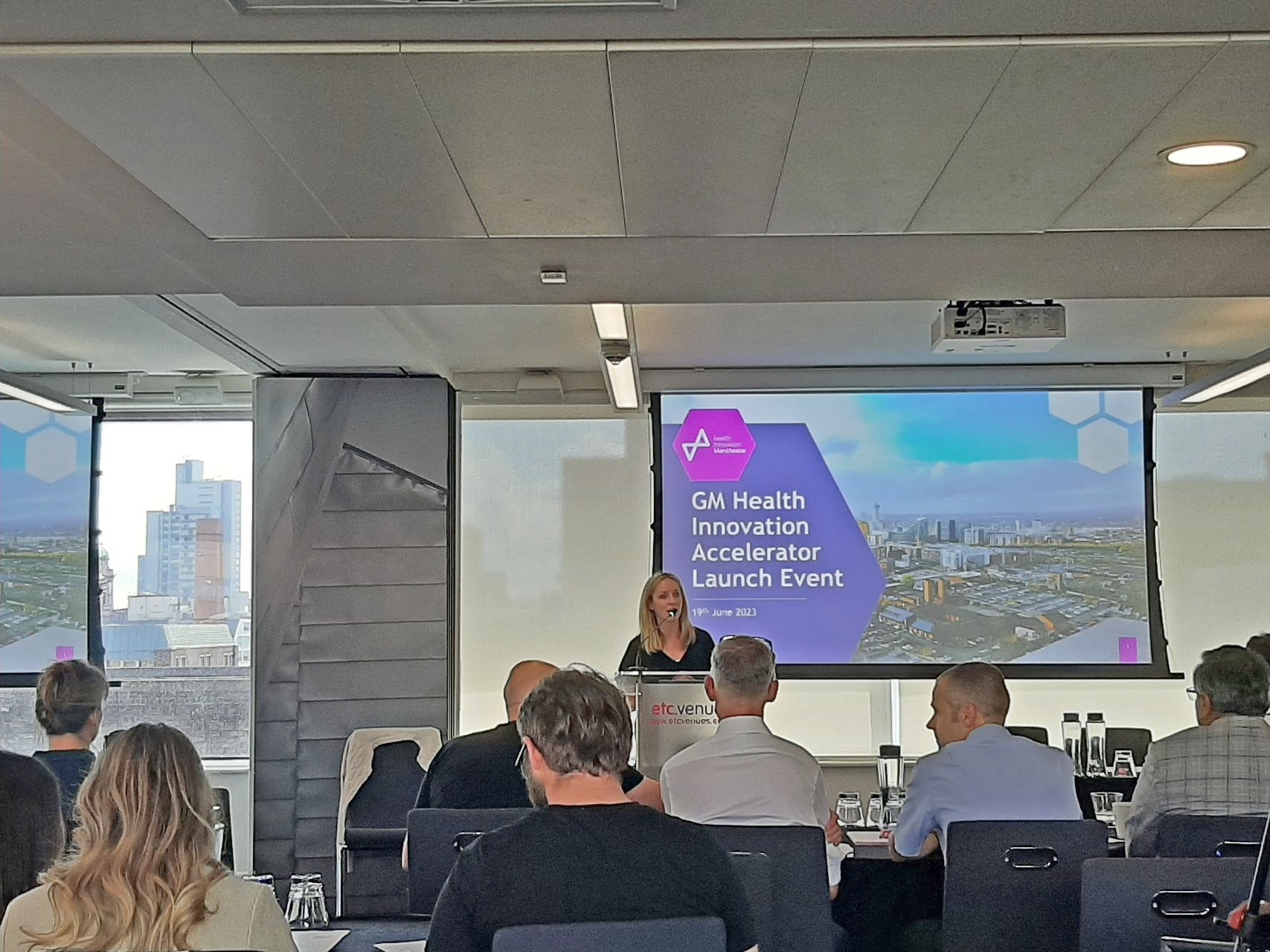This week Greater Manchester launched its new multi-million-pound health innovation accelerator by revealing the projects that the two-year programme will support.
The Health Innovation Accelerator aims to rapidly improve the diagnosis and treatment of disease across Greater Manchester’s population, helping to address health inequalities. The health innovation accelerator will focus on tackling some of the most challenging disease areas through early diagnosis using novel approaches and holistic treatment aligned to people’s specific needs. It is hoped this will help to save more lives and improve health outcomes for people at high risk or living in the most disadvantaged communities.
Health innovation brings together academic institutions, innovators, businesses, NHS assets, healthcare providers and local authorities to create tangible solutions to the region’s healthcare needs.
Through working with innovative projects that focus on early diagnosis, it’s hoped that the Health Innovation Accelerator programme will be a catalyst for broader research throughout Greater Manchester. This Accelerator will form the basis of the creation of a health innovation ecosystem, becoming a major globally competitive centre for research and innovation.
The Acceleration Innovator launch event in Manchester City Centre on Monday 19 June 2023 began with a poignant reminder of why early diagnosis is so important by sharing the patient’s perspective of Russ Cowper. All of the projects funded by the Accelerator prioritise early diagnosis of health issues that affect large communities across Greater Manchester, particularly ethnically diverse or socio-economically deprived areas.
Then Ben Bridgewater, CEO of Health Innovation shared the ambitions for the Innovation Accelerator programme before the spotlight was turned on the delivery projects.
Innovators and project leaders discussed what their share of Innovation Accelerator funding aimed to achieve, how they would research and the common health issues in Greater Manchester communities that it hopes to address.
The Health Innovation Accelerator projects are:
- DEVOTE – Development and Validation of Technology for Time Critical Genomic Testing – rapid genomics testing to improve care and benefit whole communities, where previously this technology took days or weeks and was very exclusive. This solution will address issues like adverse drug reactions, strokes and issues surrounding pain relief.
- EARLY HF – Detecting EARLY Heart Failure in Greater Manchester – developing a risk prediction tool to give an idea of those at high risk of heart failure in ethnically diverse or socially deprived areas.
- Redesigning liver care pathways to target under-served high-disease burden communities – liver disease is the 3rd biggest cause of premature death in Greater Manchester, this project would raise awareness of liver disease risks, bring liver health checks to communities and use AI to develop risk prediction algorithms
- Chronic Kidney Disease Risk Stratification – to identify when a person has chronic kidney disease or type 2 diabetes to slow down the progression to failure
- Integrating real-time POCT into lipids Management – supporting the management of high cholesterol through early diagnosis.
- Remote Spirometry ADA – improving access to spirometry making it more affordable and user-friendly to support patients with asthma and respiratory conditions.
- Lung Health Checks – the lung health check was born in Greater Manchester as mobile screening offers holistic intervention to people at risk. Building on the lung health check to research in communities and make screening more accessible.
- Pre-Hospital Diagnosis of Acute Coronary Systems – an early diagnosis disease to identify heart attacks, the most common reason for a 999 call. Anyone who needs care can then be taken immediately to the necessary care, and low-risk patients can either bypass A&E triage or stay at home. This will reduce unnecessary ambulance use and improve rapid response to those who need it.
Ben Bridgewater CEO of Health Innovation Manchester said: “Addressing inequalities is now at the top of the city-region agenda. As we roll out innovation, we need to do it in a way that addresses inequalities. We need to have a much stronger, more resilient ecosystem from this, with better connectivity across projects, a focus on digital will ensure this connectivity.”
Rowena Burns, Chair of Health Innovation Manchester said: “One of the things that health innovation Manchester was set up to do was to bring together all of the assets in Greater Manchester, the academic institutions, industrial assets and our NHS assets, to develop novel solutions to real problems.
“Success for this type of initiative attracts more success. It improves our reputation and means businesses will want to move here, creating highly skilled jobs.”
Chief Officer for Strategy & Innovation at NHS Greater Manchester Integrated Care said “We have to shift the system from one that is trapped in a crisis response to one that can respond and act. The need for us to spread innovation is real and is a central part of a strategy we need to pursue as an integrated care system.
“The brief for an innovation ecosystem is easy to create but hard to deliver. It must be responsive to the people and their needs. It needs to be coordinated in a way that is set to reduce inequalities, which needs to be a key aim. We have to be forensic and purposeful about addressing barriers and it needs to be deployed at scale.”

